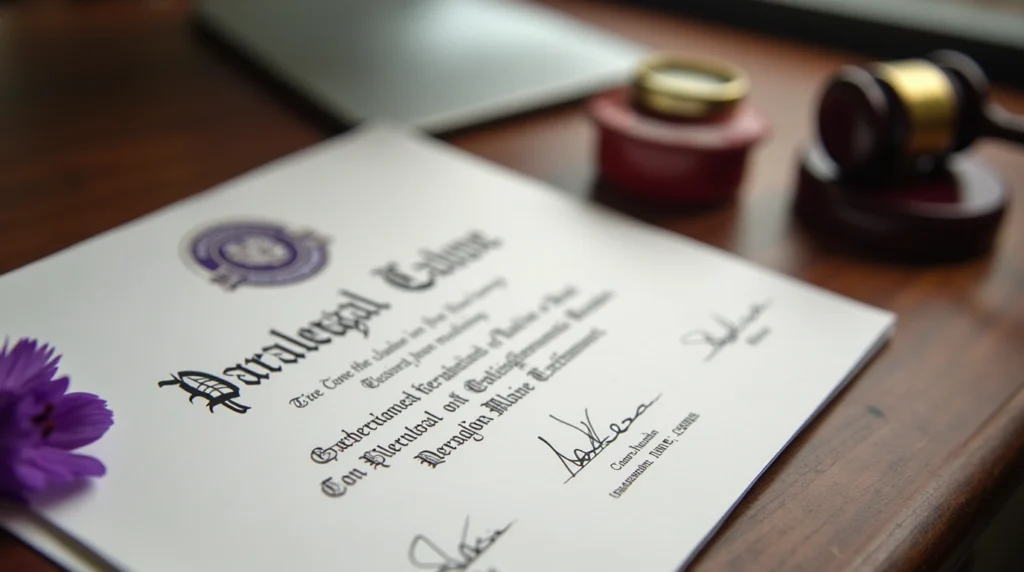Let’s cut through the noise. If you’re sniffing around the TCU Paralegal Certificate, you’re probably asking yourself some big questions: Can this thing get me a job? Is it worth the cash? Will it actually teach me something useful? I’ve been around the legal block—fifteen years as a paralegal, from scrambling through recessions to juggling case files for attorneys who’d lose their heads if they weren’t attached. So, let’s sit down, grab a metaphorical coffee, and figure this out together.
This isn’t your typical college program. Texas Christian University doesn’t have paralegals streaming out of its ivy-draped classrooms. What you’re looking at is a deal they’ve struck with the Center for Legal Studies (CLS) by BARBRI. TCU’s name is on the certificate, but CLS runs the show. It’s 100% online, 14 weeks long—two chunks of seven weeks each—and built for people who can’t drop everything to sit in a lecture hall. You finish, and you get a piece of paper saying “TCU” on it. Sounds simple, but there’s more to unpack.
The course is about getting you ready to work, not to ponder legal philosophy. You’ll learn the nuts and bolts—how to dig up case law on Westlaw, draft a motion that doesn’t make an attorney cringe, or keep a case on track when deadlines are breathing down your neck. Think legal research, civil litigation basics, contracts, maybe a taste of criminal or family law if you go deeper. It’s the kind of stuff I wish I’d known when I started, back when I was drowning in discovery documents and praying for a lifeline.
Cost-wise, it’s $1,895 for the core program. Textbooks? Extra. That’s not a small number, but it’s not law school debt either. They’ve got payment plans if you’re tight, which is a relief—because who has two grand just lying around? If you’re hooked and want more, there’s an Advanced Paralegal Certificate with six specialized topics—think Immigration Law or Intellectual Property—for $660 each, totaling $3,960 if you do the full run. Compare that to some ABA-approved degree programs at places like Tarrant County College, and it’s a steal, though those come with more time and structure.
Here’s where it gets interesting. This isn’t ABA-approved. The American Bar Association only blesses degree programs—Associate’s, Bachelor’s, that sort of thing. Certificates? Out of their lane. Some docs I’ve seen claim otherwise, but that’s a mix-up . Doesn’t mean it’s junk—TCU’s rep in Texas, especially around Fort Worth, gives it clout. Firms in Dallas-Fort Worth know the name, and that can open doors. One gal I met, Anna, said it was a game-changer for her job hunt because TCU meant something locally . CLS says 90% of students find it current, 95% recommend it, and 85-90% see job boosts . My old cohort? We hit about 85% placement within three months—$45K to $65K starting, depending on the gig.
TCU Paralegal Certificate: What You’re Really Getting Into

The setup’s flexible. No 6-9 PM classes or Saturday marathons like some older programs . It’s all online, 24/7 access—videos, handouts, a platform that’s supposed to keep you engaged. I’ve seen worse; back in my day, it was binders and a prayer. You can work it around a job, kids, whatever. But don’t kid yourself—it’s still work. Fourteen weeks sounds short, but it’s intense. Legal research nearly broke me when I started—Westlaw felt like a maze, and case briefing was a foreign language. Now? I can do it half-asleep.
The teachers aren’t just professors. They’re attorneys, paralegals—people who’ve lived it. My civil procedure guy was a judge who’d pause to spill real courtroom dirt. That’s gold you won’t find in a textbook. They’re not there to coddle you, though. You’ll wrestle with contracts, torts, ethics—stuff that matters when you’re the one keeping a case from falling apart. It’s not about theory; it’s about doing.
Who’s this for? Two types, really. First, the career switchers—folks tired of dead-end jobs who see legal work as steady, challenging, maybe even rewarding. No law school, no $150K debt, just a foot in the door. Second, the upskillers—maybe you’re already in a law firm, filing papers, answering phones, and want to climb higher. No bachelor’s degree required, which is a plus over some programs.
TCU Paralegal Certificate: What Happens After

Let’s talk reality. This certificate isn’t a golden ticket, but it’s a solid start. In Texas, paralegal jobs are growing faster than the national average . Law firms, corporate legal departments, government gigs—even real estate or insurance if you’re creative. Starting pay’s decent—$45K to $65K in my experience, though big downtown firms or specialties like IP can push higher . CLS throws in a career center if you finish 60% of the course, hooking you up with employers. Networking’s on you, though—Fort Worth’s legal scene is buzzing, and TCU’s location helps if you hustle .
I’ve seen it play out. Some classmates landed at flashy firms, others with the DA. One’s in-house at a corporation now. But I’ve also seen flops—people who thought the certificate alone would do the heavy lifting. It won’t. Firms don’t care about your paper—they care if you can handle a stack of files without blinking. The skills—document prep, client wrangling, deadline juggling—that’s what sticks. The first year on the job teaches you more than any course, but this gives you the base to survive it.
TCU Paralegal Certificate: How It Stacks Up
Compare it to the field. Tarrant County College has an ABA-approved Associate’s—more formal, more time, more money . Texas State’s got a 24-hour graduate certificate, but you need a BA and a 3.0 GPA, and it’s tied to a Master’s. TCU’s CLS version is the scrappy one—fast, online, no prerequisites beyond grit. You pick TCU at signup, but CLS runs it with tons of schools. Same game, different jersey . Not as prestigious as a degree, but quicker and cheaper if you’re itching to work.
The catch? Some employers want ABA-approved creds. If you’re eyeing a top-tier firm or a picky market, that could sting . But in North Texas, TCU’s name often trumps that. It’s a trade-off—speed and cost versus formal weight.
The Raw Truth

Here’s my take, from someone who’s been there. This program’s for grinders. It’s not glamorous—paralegal work isn’t “Law & Order.” It’s tedious some days, chaotic others, but never dull. You’re the attorney’s lifeline, the client’s first call, the one who keeps the train on the tracks. The TCU Paralegal Certificate won’t make you a lawyer, but it’ll make you damn good at supporting one. Fourteen weeks, a couple grand, and a shot at something real.
Don’t sleepwalk through it. Dig in. Ask questions. The instructors know their stuff—milk them for it. And when you’re done, hit the ground running—network, hustle, prove you’re worth it. I started in 2008, desperate for a paycheck. This kind of program got me in, and what I did after kept me there. Your move—what’s your next step?
FAQ
What does the TCU Paralegal Certificate cost?
It’s $1,895 for the 14-week base course, plus textbooks. Advanced options run up to $3,960. Payment plans help.
Is the TCU Paralegal Certificate ABA-approved?
No, it’s a certificate, not a degree—ABA doesn’t approve these. TCU’s name still carries weight, especially in Texas.
Who should take the TCU Paralegal Certificate?
Beginners switching careers or folks in legal jobs wanting a boost. No degree needed, just discipline.

